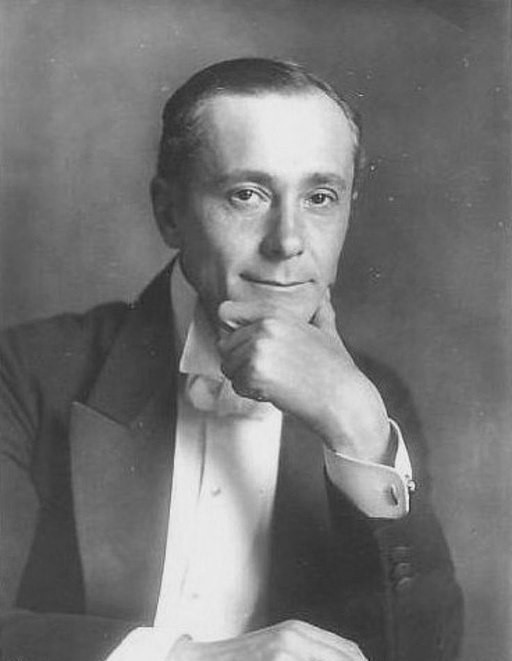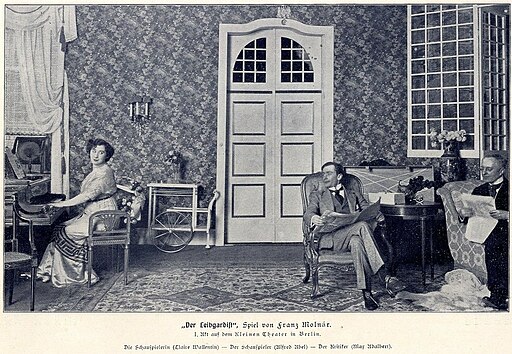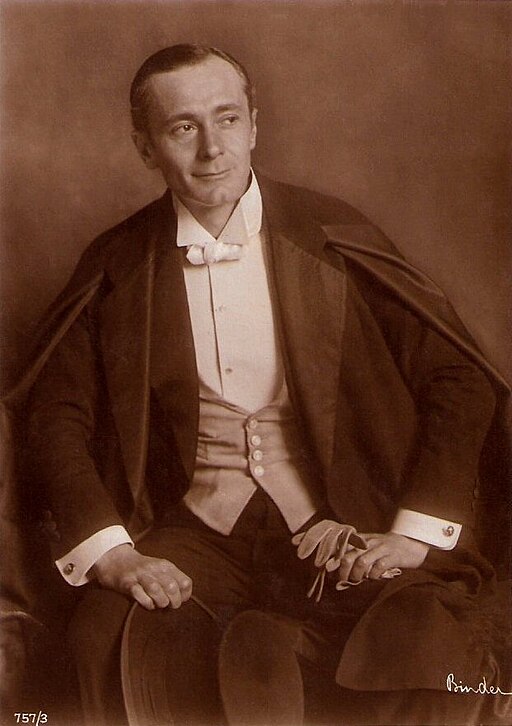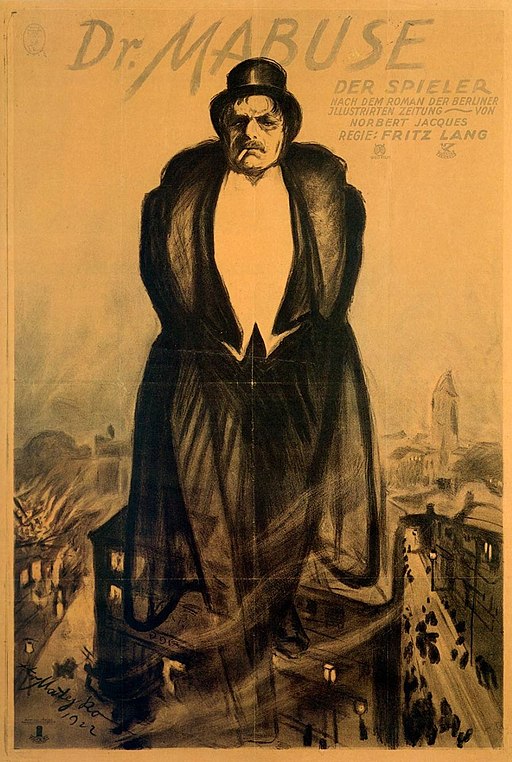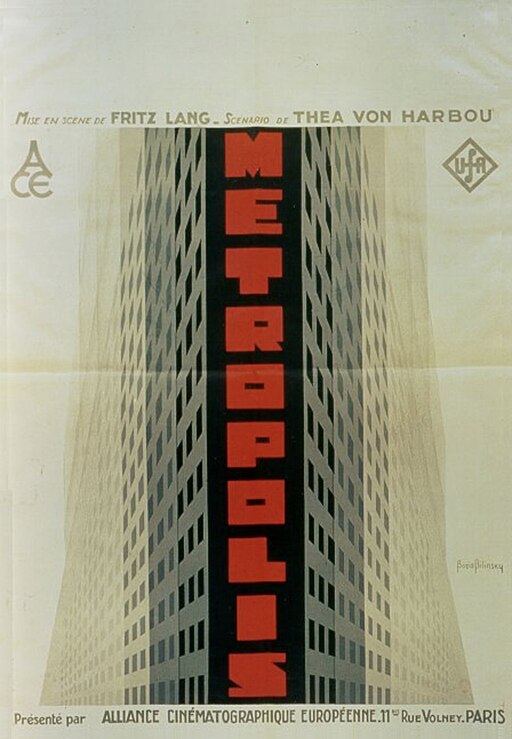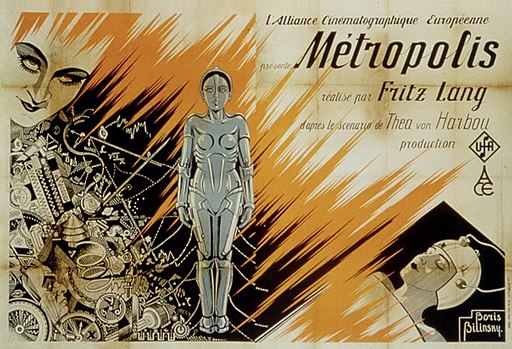Alfred Abel
back| Full Name | Alfred Peter Abel |
| Stage Name | Alfred Abel |
| Born | March 12, 1879 |
| Birthplace | Leipzig, Germany |
| Died | December 12, 1937 |
| Buried | Südwestkirchhof Stahnsdorf in Stahnsdorf, Brandenburg, Germany. |
| Married to | Elisabeth Utecht |
| Children | Ursula Abel |
| Notable films | Dr. Mabuse the Gambler (1922) - Metropolis (1927) - The Count of Cagliostro (1920) - Lulu (1923) |
Alfred Abel
The Sophisticated Luminary of Silent Cinema
Alfred Abel had a prolific career in the silent film era, particularly in German cinema. He was known for his distinguished presence and versatility, which allowed him to portray a wide range of characters, from nobility to commoners.
His work with renowned directors like Fritz Lang and G.W. Pabst placed him among the notable actors of his time. His performances in films like "Metropolis" and "Dr. Mabuse the Gambler" have left a lasting impact on the world of cinema.
Related
Alfred Abel
Biography and Analysis of his Career
Alfred Peter Abel was born on March 12, 1879, in Leipzig, Germany. Growing up in a middle-class family, Abel was initially drawn towards a career in engineering. However, his deep-rooted passion for the performing arts led him to abandon his technical studies in favor of pursuing a career in acting. This decision marked the beginning of a journey that would see him become one of the prominent figures of the silent film era.
Path Towards Success
Abel's acting career began on stage, where his talent quickly garnered attention. His theatrical work, characterized by a nuanced and expressive style, eventually led him to the burgeoning world of cinema. Abel's film debut is often cited as "The Dancer Barberina" (1910), where he began to establish himself as a versatile actor.
During the silent film era, Abel's career flourished. He was known for his sophisticated demeanor and the depth he brought to his characters. His ability to convey complex emotions without words made him a natural fit for silent cinema. Abel worked with some of the era's most renowned directors, including Fritz Lang and G.W. Pabst, which further elevated his status in the film industry.
Marriages and Personal Life
Alfred Abel was married to Elisabeth Utecht, and together they had a daughter named Ursula Abel. Details about his family life are relatively sparse, but it's clear that he balanced a demanding film career with his responsibilities as a husband and father.
Passions and Artistic Contributions
Apart from his acting career, Abel had a keen interest in the arts. He was an avid reader and enjoyed immersing himself in the cultural milieu of his time. Abel's passion for the arts transcended his film roles, influencing his approach to acting and his understanding of the characters he portrayed.
Notable Roles and Achievements
Abel's portrayal of Joh Fredersen in Fritz Lang's "Metropolis" (1927) is perhaps his most iconic role. This film, with its futuristic setting and groundbreaking special effects, showcased Abel's ability to adapt to diverse and challenging roles. His performance in "Dr. Mabuse the Gambler" (1922) is another testament to his acting prowess, highlighting his versatility and depth as an actor.
As a leading figure in the silent film era, Abel's work with renowned directors like Fritz Lang and G.W. Pabst and his roles in landmark films like "Metropolis" and "Dr. Mabuse the Gambler" place him among the luminaries of early cinema.
Death and Cause of Death
Alfred Abel's life and career were cut short when he passed away on December 12, 1937, at the age of 58. He died of a heart attack in Berlin. His death marked the end of an era in German cinema, as he was one of the last great stars of the silent film age. Abel was cremated, and his ashes are located at Südwestkirchhof Stahnsdorf in Stahnsdorf, Brandenburg, Germany.
Legacy
Although Alfred Abel's career declined with the advent of sound films, his contributions to the silent film era have left a lasting imprint on the history of cinema. His performances in landmark films like "Metropolis" and "Dr. Mabuse the Gambler" continue to be celebrated for their artistic depth and historical significance. Abel's legacy lives on as a symbol of the golden age of German silent cinema, and his work remains a subject of study and admiration for film enthusiasts and historians alike.
Trailer of Metropolis:
Analysis of the Acting Style of Alfred Abel:
Alfred Abel's acting style, particularly notable during the silent film era, was characterized by its subtlety, depth, and versatility. His performances were marked by a refined sophistication, making him a distinguished figure in early cinema. Here's a more detailed analysis of his acting style:
Expressive Subtlety
In an era where over-exaggeration was a common trait among actors, Abel's approach was notably more subdued and nuanced. He had the ability to convey a range of emotions through subtle gestures and facial expressions. This expressive subtlety made his performances more realistic and relatable, a quality that was highly valued in silent films, where dialogue could not be used to convey emotions or thoughts.
Sophisticated Demeanor
Abel often portrayed characters of high social status or intellectual depth, which suited his sophisticated demeanor. He had an air of elegance and gravitas that lent credibility to these roles. Whether playing a count, a businessman, or a criminal mastermind, Abel brought a sense of authenticity and depth to his characters.
Versatility
One of the most striking aspects of Abel's acting was his versatility. He seamlessly transitioned between different character types, from noble and authoritative figures in films like "Metropolis" to more vulnerable and manipulated characters as seen in "Dr. Mabuse the Gambler." This versatility was a testament to his range as an actor and his understanding of diverse character psychologies.
Emotional Depth
Abel's performances were marked by an underlying emotional depth. He had a talent for portraying complex internal states, often reflecting the inner turmoil or moral conflicts of his characters. This ability to depict internal struggles made his performances compelling and resonant with audiences.
Adaptability to Directorial Styles
Abel worked with some of the most renowned directors of his time, like Fritz Lang and G.W. Pabst. His adaptability to different directorial styles and his ability to embody the vision of these directors was a hallmark of his career. Abel's performances in Lang's highly stylized and thematically complex films showcase this adaptability.
Influence of Theatrical Training
Coming from a theatrical background, Abel's acting was grounded in the principles of stage performance. However, he skillfully adapted these skills for the screen, understanding the nuances of film acting, which required a more restrained approach than theatrical performances.
Abel's acting style had a significant influence on the evolution of film acting. His approach demonstrated that powerful performances could be achieved through subtlety and emotional depth, without relying on over-dramatization. This style influenced the transition from the exaggerated expressions of the early silent era to more naturalistic performances that became prevalent with the advent of sound films.
Significance of “Dr. Mabuse the Gambler” for his Career:
"Dr. Mabuse the Gambler," released in 1922 and directed by Fritz Lang, holds a significant place in Alfred Abel's career for several reasons:
Career Highlight and Impact
- Collaboration with Fritz Lang: Working with Fritz Lang, one of the most influential directors of the silent era, was a major milestone in Abel's career. Lang's innovative techniques and complex storytelling were instrumental in shaping early cinema, and Abel's involvement in one of Lang's seminal works significantly raised his profile in the film industry.
- Exposure to a Wider Audience: "Dr. Mabuse the Gambler" was a major production and gained considerable attention both in Germany and internationally. Abel's role in this high-profile project exposed him to a wider audience, further cementing his status as a leading actor of the silent film era.
- Complex Character Portrayal: Abel played Count Told, a character entangled in Dr. Mabuse's web of manipulation and deceit. This role allowed Abel to showcase his range as an actor, as he portrayed a character who was both a victim of circumstances and a person of influence. It was a testament to his ability to handle complex, multifaceted roles.
Artistic and Historical Significance
- Representing the Weimar Era: The film, set in the Weimar Republic, was reflective of the social and political tumult of post-World War I Germany. Abel's performance contributed to the film's exploration of themes such as corruption, decadence, and the crisis of identity, which were central to the German experience during that period.
- Part of a Landmark Series: "Dr. Mabuse the Gambler" is the first in a series of films about the character Dr. Mabuse, all of which have become classics in German cinema. Abel's association with this landmark series further solidified his place in film history.
- Style and Technique: The film's innovative use of montage, special effects, and narrative structure were groundbreaking at the time. Abel's performance had to harmonize with these stylistic innovations, demonstrating his adaptability and skill as an actor in the rapidly evolving medium of film.
Legacy
- Influence on Film Noir and Psychological Thrillers: The film is often cited as a precursor to film noir and psychological thrillers. Abel's role in this pioneering work had a lasting impact on these genres, influencing the portrayal of complex psychological states and moral ambiguity.
- Enduring Influence: "Dr. Mabuse the Gambler" continues to be studied and admired for its artistic and technical achievements. Abel's performance in this film contributes to his enduring legacy in the world of cinema, showcasing his talents in a film that remains influential nearly a century later.
Awards and Recognition:
Alfred Abel did not receive any notable awards.
During Abel's time, the film industry did not have the same structured system of awards and honors that we see today. The concept of film awards as a regular, institutionalized practice was still in its infancy. Moreover, many awards that are now prestigious and globally recognized, such as the Oscars, BAFTA, and Cannes Film Festival awards, either didn't exist or were not as prominent during his active years.
However, it's important to note that the lack of formal awards does not diminish the impact and significance of Alfred Abel's contributions to cinema. He is remembered for his performances in groundbreaking films like "Metropolis" and "Dr. Mabuse the Gambler." His work with directors like Fritz Lang and G.W. Pabst placed him among the notable figures in film history, and his performances are still studied and admired for their artistic depth and historical value.
Movies featuring Alfred Abel:
1910s
- "The Dancer Barberina" (1910): Abel's film debut, a historical drama set in the 18th century, focusing on the life of a famous dancer.
- "Manya, die Ärztin" (1918): A drama where Abel likely played a supporting role.
1920s
- "The Count of Cagliostro" (1920): A silent film where Abel played the lead role in a story about the famous adventurer and self-proclaimed magician.
- "Vanina" (1922): A romantic drama based on a novel, with Abel in a key role.
- "Dr. Mabuse the Gambler" (1922): Abel played Count Told, a victim of the criminal mastermind Dr. Mabuse, in Fritz Lang's two-part crime drama.
- "Earth Spirit" (1923): A film based on Frank Wedekind's play, where Abel had a significant role.
- "Lulu" (1923): Abel appeared in this drama, based on two plays by Frank Wedekind.
- "The Stone Rider" (1923): A drama set in the mountains, with Abel playing a central character.
- "Carlos and Elisabeth" (1924): A historical drama featuring Abel in a leading role.
- "Michael" (1924): A drama exploring themes of art and relationships.
- "Zur Chronik von Grieshuus" (1925): A historical drama set in a feudal estate.
- "Manon Lescaut" (1926): An adaptation of the classic French novel, with Abel in a supporting role.
- "The Master of Nuremberg" (1927): A historical piece set in Nuremberg.
- "Metropolis" (1927): Abel played Joh Fredersen, the mastermind behind the futuristic city of Metropolis, in Fritz Lang's iconic science-fiction film.
- "The Love of Jeanne Ney" (1927): A romantic drama set in the aftermath of the Russian Revolution.
- "Alraune" (1928): A science fiction-horror film based on a novel, where Abel played a prominent role.
- "The Devious Path" (1928): A drama about a woman navigating the complexities of love and society.
1930s
- "The Ship of Lost Souls" (1929): A drama where Abel played the captain of a ship.
- "The Blue Angel" (1930): Abel had a supporting role in this classic film, which marked Marlene Dietrich's breakthrough.
- "The Countess of Monte Cristo" (1932): A comedy where Abel played a supporting role.
- "Don Quixote" (1933): Abel played Sanson Carrasco in this adaptation of the famous novel.

